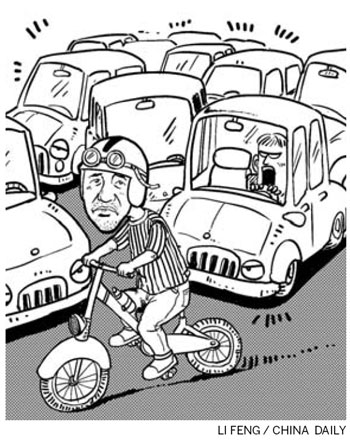E-bike dangers cause my thinking to switch gears
Updated: 2012-03-15 13:59
By Karl Arney in Zhengzhou (China Daily)
|
|||||||||||

It's no secret that traffic in China is often horrendous.
I still remember watching the news of Beijing's three-day traffic jams on CCTV a couple of months ago, and I've been caught in some nasty ones in the much smaller city of Zhengzhou, where I live. When it comes to gridlock, anyone who's spent time in China can likely commiserate.
Still, if it was only a matter of clogged roads preventing movement, the situation would be a large inconvenience but nothing dangerous. As many of us know, however, there's another element at play in many Chinese cities, and that is electronic bikes.
E-bikes, as everybody I know calls them, are currently a hot issue in China.
Between being low-priced and not requiring any kind of license, they've been huge business since well before I came here. That same accessibility also makes them a safety liability.
In Zhengzhou, gas bikes aren't allowed within the city, which makes e-bikes more prevalent.
Additionally, unlike China's elite cities, we do not currently have a subway system to provide an alternative to street transportation.
As such, the only choices for getting to places are walking, using a car or bus and hoping for minimal traffic, or taking an e-bike, which frees you from anything resembling traffic laws.
There's a definite convenience to whizzing around traffic jams and not having to rely on the city's under-staffed taxi fleet.
I also appreciate the ban on gas bikes, because this city has enough air and noise pollution without a few million motorcycles pouring through its streets.
But the fact remains that, like in other cities, every voyage with an e-bike is a dangerous one.
This has become increasingly evident among foreigners here over the past five months.
The company that employs the majority of teachers in the foreign community came up with the idea of paying the first 1,000 yuan toward its employees purchasing e-bikes. The idea was that since they staff schools all over the city, it would help all parties concerned to give us bikes.
It was a nice gesture and has made for a more mobile staff. I had to deal with the embarrassing fact that I was seemingly the only person I knew who didn't know how to drive one, having stuck exclusively to cars in the United States.
The local population in particular got endless amusement out of my ineptitude.
Whether it was watching my girlfriend, whom they think is Chinese, drive me around on the back of the bike, or watching my wobbly attempts at teaching myself to fly solo, I provided hours of entertainment for onlookers.
It was around the time that I was becoming competent that a series of incidents led me to reconsider whether or not the faster travel time is worth the trouble.
In a two-week span, three different foreigners had bike accidents. The total personal damage came out to a pair of bruised knees, a shattered tooth, a handful of stitches and some broken ribs. The last two belonged to an older Swedish man, who was hospitalized for a number of days.
All of this brings us to the root of the controversy surrounding mechanical bikes in China.
The sheer number of potentially unqualified drivers ignoring conventional traffic laws makes every moment you're on one akin to living the most intense driving video game you can imagine.
At any given moment, there are cars, buses, pedestrians and product shipments being carted to stores, and an endless sea of time-crazed bikers coming at you from 360 degrees.
It's a shame that e-bikes are so laden with danger.
They take gas-spewing vehicles off the roads and expedite travel in cities infamous for hours of congestion.
Without them, I see no way - barring a complete overhaul of traffic laws - that commuters can guarantee good time, especially in cities that lack subways. I am just also increasingly unsure that the risks are always worth the benefits.
Today's Top News
Rescuers race against time for quake victims
Telecom workers restore links
Coal mine blast kills 18 in Jilin
Intl scholarship puts China on the map
More bird flu patients discharged
Gold loses sheen, but still a safe bet
US 'turns blind eye to human rights'
Telecom workers restore links
Hot Topics
Lunar probe , China growth forecasts, Emission rules get tougher, China seen through 'colored lens', International board,
Editor's Picks

|

|

|

|

|

|





